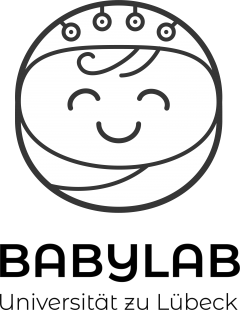-
Unsere Forschungsgruppe wächst!
Im letzten Jahr hat unsere Forschungsgruppe viele neue Mitglieder bekommen! Schon seit Sommer sind Antonia Düfeld als Doktorandin und Laura Maffongelli als Postdoc mit an Bord. Im November ist dann noch Robin Nehler zu uns gestoßen, der ebenfalls mit seiner Doktorarbeit angefangen hat. Wir freuen uns auf viele spannende neue Projekt im kommenden Jahr und…
-
Wie nehmen Kinder und Erwachsene soziale Hierarchien wahr?
Die Ergebnisse unserer Kindergartenstudie sind da! Wir sind in verschiedene Lübecker Kindergärten gegangen und haben Kinder zwischen 3 und 6 Jahren kurze Videos mit Handlungssequenzen gezeigt. Anschließend haben wir sie gefragt, wer von den Personen im Video wohl die Chefin ist. Das gleiche haben wir mit einer Gruppe Studierender gemacht. Dabei kam heraus, dass Kinder…
-
Professur!
Wir haben es in unserem letzten Post schon erwähnt, aber nun ist es offiziell: Sarah Jessen ist seit dem 1.11. Heisenbergprofessorin an der Universität zu Lübeck! Unsere Forschung hier geht also weiter und wir freuen uns auf viele spannende Studien in den kommenden Jahren!
-
Heisenbergförderung
Sarah Jessen wurde in das Heisenbergprogramm der DFG aufgenommen! Nähere Infos dazu und wie es mit unserer Forschung hier weitergeht in Kürze!
-
Neuer Artikel über die Verarbeitung von sozialem Ausschluss bei Erwachsenen
In ihrer neuen Studie untersuchte Pauline Petereit aus der Cognitive Neuroscience Group wie unterschiedlich Erwachsene auf sozialen Zurückweisung reagieren! Nähere Infos zu der Studie finden Sie hier: Petereit, P., Jessen, S., Goregliad Fjaellingsdal, T., & Krämer, U.M. (2022). Social Context and Rejection Expectations Modulate Neural and Behavioral Responses to Social Feedback. Journal of Cognitive Neuroscience,…
-
Lehrpreis 2021 der Universität zu Lübeck
Neben Forschung besteht ein großer Teil unserer Arbeit aus Lehre an der Universität zu Lübeck. Für ihre Lehre im Fach „Sozialpsychologie“ wurde Sarah Jessen in diesem Jahr mit dem Lehrpreis der Universität zu Lübeck ausgezeichnet. Danke an die Universität und alle Studierenden aus der Lehrveranstaltung für ihr riesiges Engagement! Näheres über die Preisverleihung gibt es…
-
Neural tracking zur Analyse von EEG-Daten im Entwicklungskontext
In einem gerade erschienen Fachartikel diskutieren und erläutern wir, wie eine neue Methode zur Datenanalyse, das sogenannte Neural Tracking, auf die EEG-Daten von Babys angewandt werden kann. In den meisten Studien, die wir sonst machen, verwenden wir eine andere Analysetechnik, bei der wir uns sogenannte ereigniskorrelierte Potentiale (EKPs) anschauen. Damit das funktioniert, muss den Babys…
-
Welche Hirnnetzwerke spielen für Belohnung und Verhaltenskontrolle eine Rolle?
Unsere Doktorandin Bernadette Hippmann hat zusammen mit ihren Ko-Autor*innen einen neuen Artikel in der Zeitschrift Human Brain Mapping veröffentlicht. In dieser Studie mit erwachsenen Probanden untersucht sie, welche Hirnbereiche bei verschiedenen Entscheidungsaufgaben wie zusammenspielen und ob das ganze davon beeinflusst wird, ob man für richtige Antworten belohnt oder bestraft wird. Den ganzen Artikel dazu gibt…
-
Neuer Commentary-Artikel in Psychological Science
Auch wenn unsere Projekte leider immer noch nicht wieder so wie vor Corona laufen, sind wir nicht untätig: Gerade ist ein neuer Kommentar unter Beteiligung des Babylabs erschienen, indem wir näher auf das Phänomen Entrainment in der Analyse von Baby-EEG-Daten eingehen. Nähere Infos (leider nur auf Englisch) gibt es hier: Keitel, C., Obleser, J, Jessen,…
-
Wie beeinflusst der Geruch der Mutter die Emotionswahrnehmung von Babys?
Die ersten Ergebnisse aus unserem Forschungsprojekt zum Einfluss des mütterlichen Geruchs auf die Emotionswahrnehmung im Säuglingsalter wurden in der Zeitschrift Developmental Cognitive Neuroscience veröffentlicht. In unserer Studie haben wir herausgefunden, dass Säuglinge, die ihre Mutter riechen können, nicht die eigentlich zu erwartende erhöhte Aufmerksamkeitsreaktion auf ängstliche Gesichter zeigen. Dies könnte ein Hinweis darauf sein, dass…
